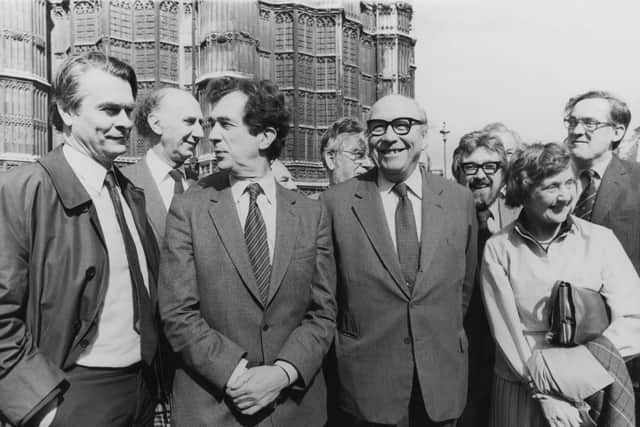Forty years on from SDP-Liberal alliance, could a new electoral pact be on the cards? - Martyn McLaughlin
Mr Steel and Shirley Williams - one of the SDP’s so-called Gang of Four, who had broken ranks with Michael Foot’s Labour party, marked the occasion by staging a photo-op on the lawn of Dean’s Yard, Westminster, where they unveiled a joint policy statement, entitled ‘A Fresh Start of Britain’.
Over the next two years, the SDP-Liberal alliance won four by-elections, with the victory of the bon viveur, Roy Jenkins, in Glasgow Hillhead among the most notable. A young Charles Kennedy was among those who campaigned for him.
Advertisement
Hide AdAdvertisement
Hide AdThe alliance’s initial rise was dizzying. History may have lampooned Mr Steel for the conference speech in which he told his activists to return to their constituencies and “prepare for government,” but at the time, such optimism was not misplaced, with support reaching as high as 50.5 per cent in the polls at one point.
The truth, however, is that that early flush of electoral success would prove to be the alliance’s high point. Come the 1983 General Election, with Margaret Thatcher’s government buoyed by the war in the Falklands, the polling numbers were shown to be a false dawn. It emerged with 25 per cent of the popular vote, and the constrictions of the first past the post system delivered a mere 23 seats.
It soon became clear that in the crowded British electoral system, there was no room for two parties to occupy third place. Out of the alliance’s ashes came the Liberal Democrats, a party which drew on some of the better ideas in the alliance’s playbook.
It is no surprise the successful campaign which saw the Lib Dems enter coalition government a decade ago was based around a set of guiding principles which borrowed the exact same title of the blueprint put forward by Steel and Williams.


But it has been a long time since the Lib Dems have enjoyed a fresh start. Nowadays, it is a diminished force. Its status as the UK’s third party is a matter of opinion in light of the SNP’s repeated successes at Westminster elections, and Ed Davey has yet to convince that he is the leader to turn things around.
Elsewhere on the centre-left, Labour, having struggled to overcome the fierce infighting which dominated its time under Jeremy Corbyn’s leadership, finds itself in similarly dire straits. Keir Starmer has failed to set out the party’s direction, with its humiliation in last month’s local elections and the Hartlepool by-election putting him under more pressure. Some in the party are asking a question which has occupied the minds of its activists and supporters in Scotland for some time now - namely, can it ever win again?
Could the answer be a new alliance between Labour and the Lib Dems? The electoral mathematics would certainly support such an idea, given the Lib Dems came second in 91 of the 2019 constituency votes, all but five of which were won by the Tories.
Were Labour and the Lib Dems to come to an agreement that they would not stand against each other in target seats, it would not necessarily guarantee victory, but it would undoubtedly reduce the chances of a Tory majority.
Advertisement
Hide AdAdvertisement
Hide AdThere would be resistance in Labour’s ranks to the idea, and any alliance would like depend on the SNP or the Greens, which further complicates matters. Other obstacles would lie in wait, such as impending boundary changes, and the expected inclusion of mandatory ID checks at polling stations in the Electoral Integrity Bill.
But here is perhaps where Labour and the Lib Dems could overcome tribal rivalries and mutual distrust by uniting around a commitment to proportional representation. Electoral reform was, it so happens, a key part of the SDP-Liberal alliance manifesto.
For some reason, Mr Starmer seems unwilling to accept that this is the kind of major commitment which would renew his party’s sense of purpose. Millions of people around Britain have grown disillusioned because they feel their vote no longer matters. He has said as much. A cross-party campaign to change that would be to the benefit of our entire democracy.
The obvious argument against such a partnership is fresh in the memory in the form of Change UK, the centrist vehicle which burned out just ten months after its formation in the wake of its humiliation at the 2019 European Parliament elections, where it garnered a mere 4.4 per cent of the vote.
For a new party which counted Chuka Umunna and Anna Soubry as its best-known MPs, the writing was perhaps on the wall from the get-go. Change UK only ever had one significant policy - a determination to remain in the European Union. When it quickly became clear there was no hope of it translating into reality, its demise was simply a matter of time.
The party’s short-lived cameo in British was not helped by the absence of the kind of planning which ensured the SDP-Liberal alliance became, for a time, a viable proposition in the eyes of voters.
Labour and the Lib Dems have the resources and the time to go one better. It may yet come to pass that either, or even both parties, will rediscover relevance and popularity on their own terms, but I would not put money on it. Talk of an alliance may be anathema to many, but if the aim of the game is to form a viable electoral force, it could represent the least worst option.
A message from the editor:
Thank you for reading this article. We're more reliant on your support than ever as the shift in consumer habits brought about by coronavirus impacts our advertisers. If you haven't already, please consider supporting our trusted, fact-checked journalism by taking out a digital subscription.
Comments
Want to join the conversation? Please or to comment on this article.
